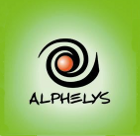 |
|
|
| RCL2®, Formalin-free tissue fixative |
|
|
| RCL2®, a true solution for formalin-free tissue fixation for a better service to Patient |
| |
| Tissues fixation has been for decades using formaldehyde based reagents such as formalin or AFA (alcohol+formalin+acetic acid). Formaldehyde reacts with the bio specimen by creating covalent bounds between biological macromolecules, thus stabilizing them and inhibiting enzymatic activities.
While of massive use in all pathology labs of the world whether in human or animal histology, formalin and its variations demonstrate two major well known for ages disadvantages:
(1) Formalin is a highly toxic reagent. Classified carcinogenic of class I by WHO since October 2006, it is demonstrated to be at the proven beginning of respiratory pathologies, allergies and respiratory tract cancers. |
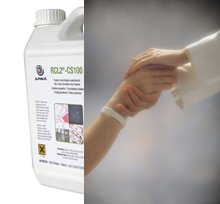 |
(2) The chemical action of formalin binds severely DNA, RNA and proteins and makes them difficult or even impossible to extract in adequate quantitiesand qualities for expanding molecular predictive tests to new targeted treatments.
Developed since 1999 by Dr Philippe ROCHAIX, pathologist at the Department of Pathology of Professor VOIGT, Cancer Research Centre Claudius Regaud, Toulouse, France, RCL2® is a new, truly innovative tissue fixative, preserving tissue structures and cells. |
| |
|
| Make molecular diagnosis on each and every tissue specimen for a better service to the Patient thanks to RCL2® |
| |
Specimen formalin fixation is a major obstacle to medical research and the development of molecular techniques for patient profiling in the identification of targeted therapies. RCL2® fixes tissues while preserving histological and molecular components at a high level of quality and yield.
By changing to RCL2®, you facilitate Patient access to most modern and efficient therapeutic methods to better cure without altering unnecessarily Patient quality of life and while preserving Health costs. |
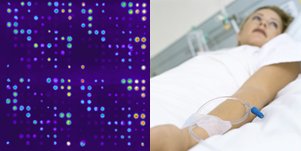 |
Adopt RCL2® and move your lab to the molecular pathology era. Change for a better service to Patient.
ALPHELYS will bring you all the required technical support in protocols optimization to speed up the transition process. |
|
| RCL2® allows you to combine histology and molecular techniques on the exact same specimen for a higher efficiency in your Research |
 |
| |
The use of formalin in tissue fixation for diagnosis and histology obliges laboratories to deep-freeze part of each specimen for molecular research applications (read below). Thus, molecular biology techniques are achieved on frozen specimen different from the fixed tissues which were used to obtain the lesion type and the diagnosis.
Most of tissue and frozen tumour banks do not have the required massive resources to do a systematic quality control on each frozen tissue and guarantee that it corresponds to the correct lesion type.
Using RCL2® allows the researcher to work exactly on the same exact tissue to used for diagnosis dramatically improving efficiency and accuracy of your Research projects. RCL2® is the only tissue fixative that produces specimens of quality compatible with molecular techniques even after room temperature traditional fixation, without changing your procedures. |
|
RCL2® makes tissue and tumour banks accessible to every lab
Degradations caused by formalin fixation on tissues oblige labs to deep-freeze and store tissues specimens in costive environment at investment as well as in maintenance.
The exceptional fixation properties of RCL2® allow you to avoid deep-freezing. In a single regular fixation procedure, you fix tissues which will be compatible with diagnosis as well as molecular research and all techniques used to check tumour responsiveness to new targeted therapies.
Using RCL2® simplifies laboratory procedures and reduces your expenses.
Specimen collected from private labs and clinics constitute a large part of the total recruitment of specimens. These specimens can now be fixed with RCL2® and thus become available without extra costs to Research.
RCL2® fixed tissues can be stored at room temperature or at -20°C when a ultra high molecular quality is required. Thus, required budgets for storing tissues are strongly reduced. Exploitation is risk-less and requires only regular equipments of cheaper maintenance costs.
Without changing your procedures, the use of RCL2® to fix your tissues is a source of simplification, a source of money savings and availability of specimens to medical Research. |
| RCL2®, the only truly non toxic tissue fixative for Health and Environment |
| |
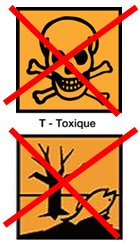 |
RCL2® components, which preparation is patent protected, are demonstrated without risks for Human health and Environment since decades in compliance with European or American regulations and are even authorized for Human food.
RCL2® Tissue Fixative has thus absolutely no risk to be one day in the future classified as dangerous unlike some other formalin-free fixatives that still contain dialdehydes, molecule of similar activity to formaldehyde and that can show dangers for Human health.
Using RCL2® preserves your staff and the efficiency of your lab by eliminating any pathogenic and carcinogenic risks of formalin.
Are you ready to invest efforts to change your tissue fixative and take the risk that it could be classified dangerous in the next future and that a new regulation obliges you to change again? Make the right choice at once, not a compromise, adopt RCL2®.
Download RCL2® MSDS here. |
|
Achieve budget savings with RCL2®
You think that the new fixatives to substitute formalin are more expensive than formalin?
Make a more global assessment of your costs.
Adopting specialized bench equipment to protect your staff from formalin vapours is expensive. You have to maintain a permanent audit of your environment to prevent contamination of your staff or even worse a temporary interruption of your activity by medical inspectors.
The management of toxic wastes, their collect and treatment by specialized contractors is also costive and involve your liability.
Make your cost assessment more globally and you will realize that RCL2® allows you to save budgets while ensuring safety and simplicity of use for you, your staff and your Environment.
Purchase serenity for yourself with RCL2®. |
| RCL2® IN IMAGES |
| |
| + RCL2® & Morphology |
| |
RCL2® preserves tissues and cells morphology.
H&E staining displays morphology and colours similar to those obtained with formalin fixed tissues. Morphology is even preserved after many years of room temperature storage as demonstrated by tests.
Unlike formalin which has a progressive chemical action that continues even after fixation and during storage, RCL2® action is immediate and complete at time of contact with tissue. There is no degradation of tissue after prolonged immersion giving more flexibility to lab organization.
RCL2® produces a hardness that is pleasant for cutting in macroscopy, it does not dilute Chinese ink that can therefore be used to identify resection limits. |
| |
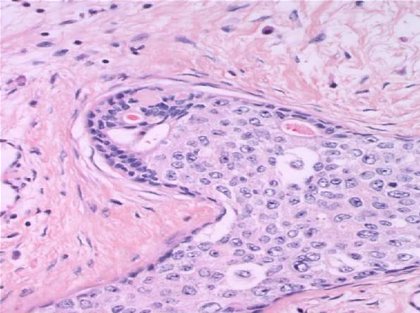 |
Breast cancer RCL2® fixed tissue section stained with H&E. |
| |
| |
| + RCL2® & Immuno-Histochemistry |
| |
RCL2® preserves the antigen content. Numerous antigens have been tested with sucess as shows the list below. Don't hesitate to contact us to learn if your antigen has been tested also.
On many antigens, signal intensity can be superior allowing for increasing antibody dilution for cost savings. You will also observe that frequently antigens may not require retrieval procedures, simplifying work at the lab and providing extra costs savings.
As with any change in fixative, it is quite expected to have some fine tuning to achieve.
ALPHELYS will bring you the necessary technical support to speed up the transition to RCL2®. |
| |
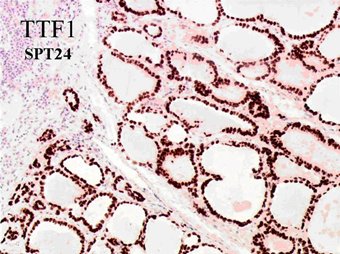 |
TTF1 immunostaining with clone SPT24 RCL2® fixed tissue, objective 10X. |
| |
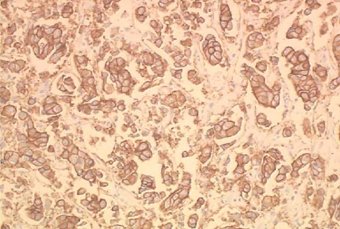 |
Her2neu immunostaining on RCL2® fixed tissues, objective 10X. |
| |
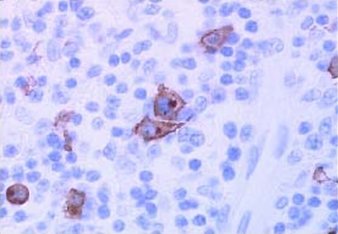 |
CD 30 immunostaining on RCL2® fixed Hodgkin's without antigen retrieval, objective 40X. |
|
- List of validated antigens on RCL2®fixed tissues -
| Antigene |
Clone |
Antigene |
Clone |
| ACE |
polyclonal |
Epithelial Membrane Antigen |
E29 |
| Actine |
|
Estrogen receptor |
6F11 |
| B cell |
DBB42 |
Galectine 3 |
9C4 |
| BCL2 |
124 |
GFAP |
polyclonal |
| Calcitonine |
polyclonal |
Hairy cell |
DBA44 |
| CD3 |
F7.2.38 |
HER2 |
DA0485 |
| CD5 |
DK23 |
HMB45 |
HMB45 |
| CD15 |
80H5 |
Ki67 |
MIB1 |
| CD20 |
L26 |
Kerzin 3 |
|
| CD23 |
|
Kerzin 5 |
|
| CD30 |
BerH2 |
Mammaglobine |
304-1A5 |
| CD31 |
JC/70A |
MDM2 |
MDM2 |
| CD34 |
QBEND10 |
Melan A |
A103 |
| CD45 |
2B11 PD7/26 |
Mic-2 |
1,20E+08 |
| CD57 |
NC1 |
Myogenine |
F5D |
| CD68 |
KP1 |
Neurofilament |
2F11 |
| CD68 |
PGM1 |
NSE |
BBS |
| CD 79 |
|
PNL2 |
PNL2 |
| CD 138 |
|
Progesteron receptor |
PgR636 |
| CD 791 |
|
Protein S100 |
DAKO |
| CDK4 |
DSC-31 |
P16 |
E6H4 |
| Cycline D1 |
SP4 |
P21waf |
SX118 |
| Chromogranine |
DAK-A3 |
P27 |
SX53G8 |
| C-Kit |
CD117 DAKO |
P53 |
DO-7 |
| Collagen IV |
CIV22 |
Smooth muscle actin |
1A4 |
| Cytokeratines |
AE1/AE3 |
Smooth muscle actin |
HHF35 |
| Cytokeratines |
KL1 |
Thyroglobulin |
DAKO |
| Cytokeratine 5/6 |
D5/16B4 |
TTF-1 |
SPT24 |
| Cytokeratine 7 |
OVTL12/30 |
Vimentin |
V9 |
| Cytokeratine 8/18 |
CK8/18 |
|
| Cytokeratine 19 |
RCK108 |
| Cytokeratine 20 |
K20.8 |
| D2 40 |
D2 40 |
| Desmine |
D33 |
| EGFR |
Kit DAKO |
|
| + RCL2® & In Situ Hybridization |
| |
| Excellent results in CISH and FISH are obtained on RCL2® fixed tissues. Expression signals are high and specific, background noise remains low. |
| |
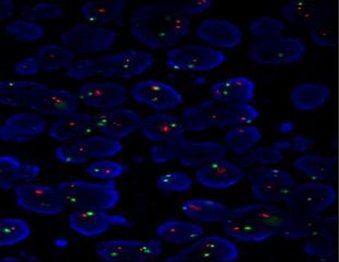 |
Her2neu in FISH on RCL2® fixed tissues, objective 40X. |
| |
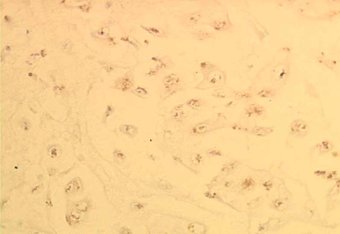 |
Her2neu in CISH on RCL2® fixed tissue, objective 40X |
|
| + RCL2® & DNA |
| |
| DNA in good quality and quantity can be extracted from RCL2® fixed tissues. DNA displays a high molecular weight and authorizes long length PCR. PCR products obtained can be easily sequenced. |
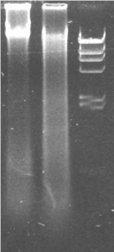 |
Genomic DNA
Lane 1: RCL2®
Lane 2: Frozen tissue
Lane 3: Lambda marker 20,000 bp max |
| |
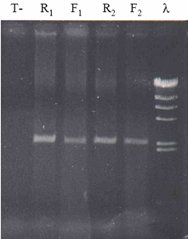 |
PCR on 2,4 kpb BRCA-1 gene
T- Negative control
R1 RCL2® fixed tissue
F1 Frozen tissue
R2 RCL2® fixed tissue
F2 Frozen tissue
Lambda marker |
|
| + RCL2® & RNA |
| |
Similar RNA extraction yield can be obtained from RCL2® fixed and paraffin embedded tissues in comparison to frozen tissues and 100 times higher than those obtained from formalin fixed tissues.
Even higher quality RNA can be obtained if you comply with optimal conditions of preservation of RNA i.e. reduce as much as possible time between resection and fixation, fix your tissues in 4°C cooled RCL2®, paraffin embedding in slightly reduced temperature and cycle time in the tissue processor and storage at -20°C.
Don't hesitate to contact us to obtain a technical support for your transition to RCL2®. |
| |
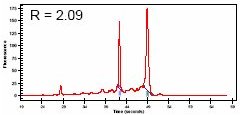
Frozen tissue |
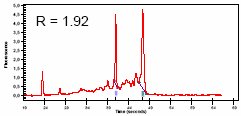
+4°C RCL2® fixed tissue |
|
| + RCL2® & Proteins |
| |
| Protein extraction yield up to 1,000 higher can be obtained in RCL2® fixed and paraffin embedded tissues compared to formalin fixed tissues. The yield is comparable to those obtained from frozen tissues. Proteins profile in acrylamide gel in 1D, 2D and Western blot are similar to those obtained from frozen tissues. SELDI-TOF profiles are also comparable. |
| |
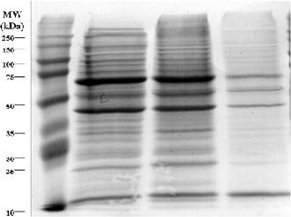 |
SDS-PAGE gel
Proteins extracted with Tris 10 mM, SDS 2%, 95°C buffer.
Lane 1 : Marker
Lane 2 : RCL2® fixed tissues
Lane 3 : Frozen tissues
Lane 4 : Formalin fixed tissues |
| |
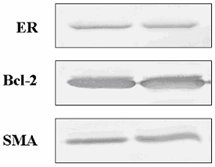 |
SDS-PAGE gel
Proteins expressed by various genes and extracted Tris 10 mM, SDS 2%, 95°C buffer.
Lane 1 : Frozen tissue
Lane 2 : RCL2® fixed tissue |
| |
 |
SELDI-TOF profile
Upper: Frozen tissue
Lower: RCL2® fixed tissue |
|
| + RCL2® & Stability |
| |
| Stability tests have been run on RCL2® fixed, paraffin embedded specimens. Observation shows no detectable modifications of morphology on specimens stored at room temperature for over 6 years. |
| |
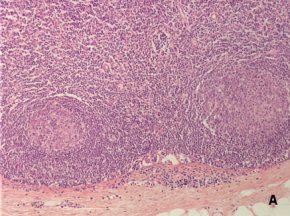 |
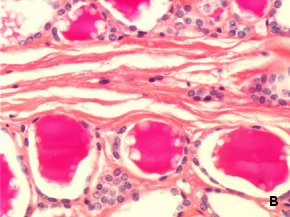 |
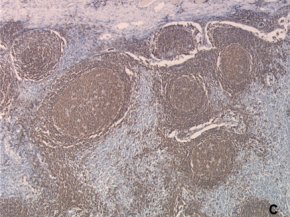 |
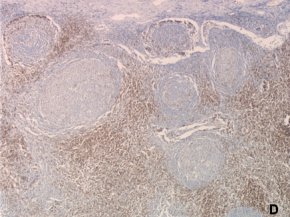 |
| |
A : Lymph node fixed with RCL2® : cellular morphology siùilar to the one obtained with formolated fixatives.
B : Thyroïd fixed in december 1999, cut and stained in january 2007 : excellent morphological preservation.
C : CD 20 immunostaining on lymph node RCL2® fixed in december 1999, cut and stained in january 2007 : excellent antigens preservation.
D : CD 3 immunostaining on lymph node fixed in RCL2® in december 1999, cut and stained in january 2007 : excellent antigens preservation. |
|
|
| + RCL2® : No changes in your method of fixation |
| |
RCL2® substitutes to your regular formalin fixative without major changes in your methods.
Fixation time is similar to formalin fixation whether at room temperature or at 4°C.
You can even gain in flexibility for your lab as specimens can be let in RCL2® in extended periods of time without consequences on tissue quality unlike with formalin.
Biopsies fixation can be achieved into most tissue processors.
Specimens fixed in RCL2® and formalin can be mixed in tissue processors for dehydration and paraffin embedding. |
| |
| + RCL2® : Preservation of your ARNs during laser microdissection |
| |
Recovery of RNA of high yield and quality from frozen sections requires significant precautions.
Indeed, it is demonstrated that once section deposited on slide, it tends to get moisture which reactivates RNAses.
Some reagents are proposed to inhibit RNAses but they usually strongly alter morphology which severely makes tissue structure and cell recognition difficult while it is a crucial argument for laser microdissection.
A research team at the National Institute for Research in Agronomics (Jouy-en-Josas, FRANCE) has demonstrated that a drop of RCL2® poured on a frozen section protects RNAs during laser microdissection and even beyond at room temperature with the major benefit to preserve tissue and cell morphology facilitating microdissection targeting. |
| |
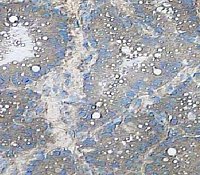 |
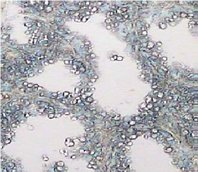
|
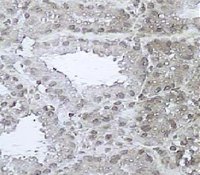 |
| |
|
|
| Frozen section |
Frozen section treated with RNAse inhibitor |
Frozen section protected with RCL2® |
|
A true alternate solution for formalin-free fixation is now available and validated.
RCL2® brings numerous benefits for Research, Healh economy, Environment and quality of service to Patient.
Contact us to try RCL2® and move your lab into the era of molecular histo-pathology. |
Publications
1. DELFOUR C, ROGER P, BRET C, BERTHE ML, ROCHAIX P, KALFA N, RAYNAUD P, BIBEAU F, MAUDELONDE T, BOULLE N. RCL2, a new fixative, preserves morphology and nucleic acid integrity in paraffin-embedded breast carcinoma and microdissected breast tumor cells. J Mol Diagn. 2006;8:157-69.
2. LACROIX-TRIKI M, LAMANT L, ALLAL CUIDER B, DECHA A, VOIGT J-J, ROCHAIX P. RCL2® a new non toxic fixative allowing extraction of high quality DNA, mRNA and proteins from paraffin embedded tissues.
3. Bellet V, Boissière F, Bibeau F, Desmetz C, Berthe M, Rochaix P, Maudelonde T, Mangé A, Solassol J., Proteomic analysis of RCL2 paraffin-embedded tissues , J Cell Mol Med . 2007 Dec 10.
4. V. Bellet, P. Rochaix, A. Mange, J. Solassol , Étude d'un nouveau fixateur pour l'analyse du protéome tissulaire, Study of a new tissue fixative for tissue proteom analysis, Ann Biol Clin 2008; 66 (4): 401-7
5. Belief V, Boissière F, Bibeau F, Desmetz C, Berthe ML, Rochaix P, Maudelonde T, Mangè A, Solassol J., Proteomic analysis of RCL2 paraffin-embedded tissues, J Cell Mol Med . 2008 Oct;12(5B):2027-36.
6. Sophie Le Guellec, Magali Lacroix-Triki, Jean-Pierre Delord, Cuider Ben Allal, Philippe Rochaix , Les nouveaux fixateurs tissulaires, New Tissue Fixative, RFL - Revue francophone des laboratoires, Vol 38, N° 408 - janvier 2009, pp. 25-32. |
| top of page |
| |
Warm thanks to
Dr Philippe ROCHAIX, Research Cancer Institute Claudius Regaud, Toulouse, France, for its novelty in the invention of this genius product.
Research Cancer Institute Claudius Regaud and its General Management for having offered to ALPHELYS this exceptional opportunity to develop and market RCL2®.
Ms Claudia BEVILACQUA, Unit of Functional and Physiological Genomic of milk production, National Institute of Research in Agronomics INRA, Jouy-en-Josas, France, for her work on RCL2® and for having let us use her images and data.
Dr Nathalie BOULLE, National Institute for Health and Medical Research INSERM Unit U540, Hôpital Arnaud de Villeneuve, Montpellier, France, for her work on RCL2® and for having let us use her images and data. |
|
|
|
|
ALPHELYS,
Ferme des Ebisoires, Impasse Paul Langevin, 78370 Plaisir - France
Tel +33 (0)1 30 07 52 95 - Fax +33 (0)1 30 07 51 56 - eMail
info@alphelys.com
Copyright © 2001/2011 ALPHELYS, all rights reserved.
|
|
|
|
|
